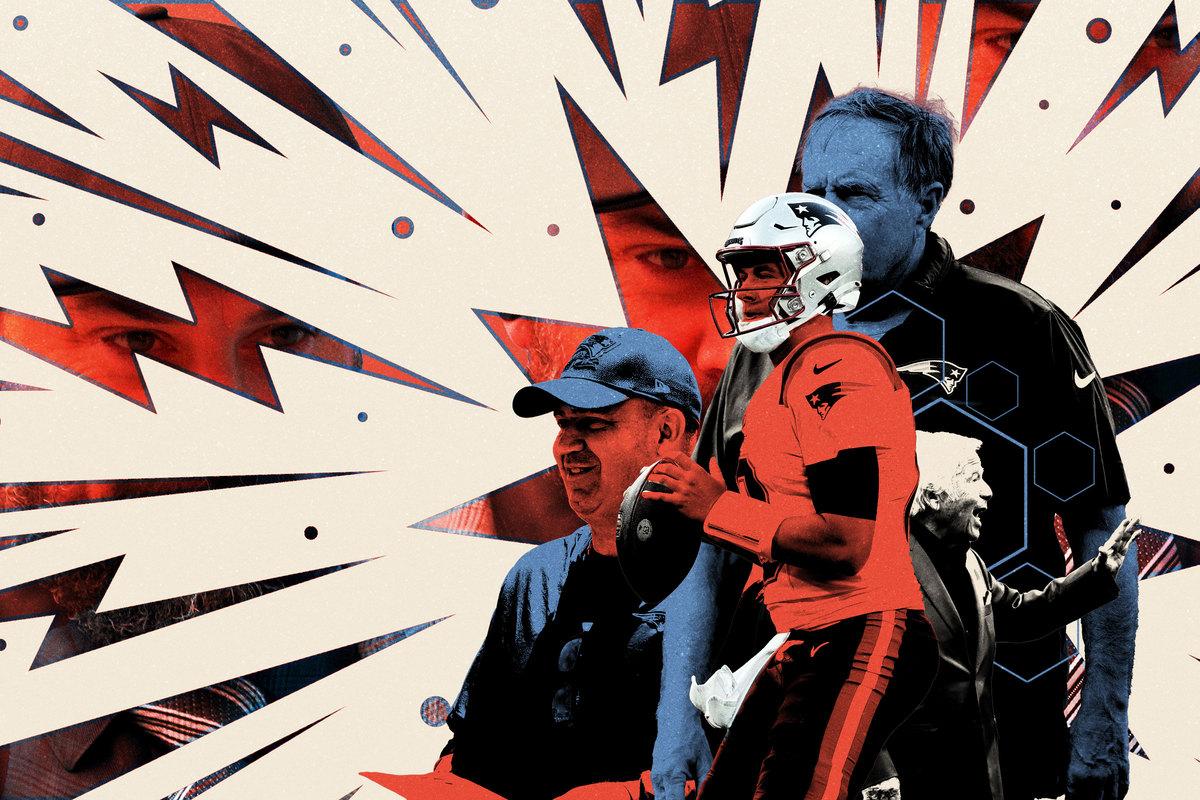
For at least a day, Mac Jones was undeniably the guy in New England. The Patriots pulled one of the surprises of roster cut-down day earlier this week when they waived both backup Bailey Zappe and third-stringer Malik Cunningham, leaving Jones as the sole quarterback on the roster. (Zappe has since been signed to the practice squad.) This was notable not because it says anything we didn’t already know about who is QB1 in Foxborough, but because it underscores the silliness of the drawn-out game of verbal gymnastics that Bill Belichick and his coaching staff have engaged in over the past several months rather than naming a starter.
It started in January, after the Patriots finished a disappointing 8-9 2022 campaign. Asked whether he envisioned Jones as the starter in 2023, Belichick answered, unsatisfyingly, “I think Mac has the ability to play quarterback in this league.” In March, asked at an NFL owners meeting whether Jones had earned the job, Belichick said, “We’ll play the best players.” By training camp, when Jones was clearly and routinely receiving the bulk of reps with the rest of the offensive starters during practices, Belichick had revamped the line but not the message. “Everybody is out here competing,” Belichick said. “That’s what everybody is doing.”
Belichick was not available to the press on cut day, but I genuinely wish he had been so that he could have been asked again. “Bill, Mac Jones is the only quarterback on your roster. Safe to say he’s secured the starting role?”
“[Muffled grumble.] We’ll do what’s best for the team. [Glares menacingly.]”
This guy. What a crank!
I point this out mostly because it amuses me, but also because it gives me déjà vu. Here’s Bill Belichick being a grump about Mac Jones is a story from last year and the year before that, too. If you follow the Patriots relatively closely, the dominant story of the post–Tom Brady era has been the drafting of Jones, at 15th in 2021, and the team’s subsequent degree of commitment to him, which is, apparently, still an open question.
But while Belichick’s equivocations may be the same as they ever were, the clock is ticking louder and louder in Foxborough. The Patriots are an even 25-25 in the three years since Brady left for Florida. It’s been four years since their last playoff victory, a fact that team owner Robert Kraft has grown comfortable voicing his displeasure over. They have until May to decide whether to pick up Jones’s $25 million fifth-year option, and beyond that, the longer-term questions about his contract and the franchise’s quarterback future are looming. They have a legendary coach just 30 wins away from topping Don Shula’s record for the most of all time, but the path to that milestone looks more harrowing than it used to now that the Patriots are no longer the favorites and may even rank at the bottom of the AFC East.
They remain a prominent and much-talked-about organization, but it’s becoming harder and harder to ignore that the preeminent team of this century just hasn’t done much in its first stretch of the post-Brady era and that it’s not clear whether it’s done enough to make sure we won’t be discussing its dysfunction and on-field futility and questionable quarterback future again this time next year.
The biggest moves of the Patriots offseason were about undoing what went wrong last season. You may have heard that Belichick went out on a limb and asked a defensive coach, Matt Patricia, to serve as offensive coordinator and that it didn’t go great. The Patriots finished 25th in offensive expected points added (EPA), and Jones regressed from his encouraging rookie-year performance. The vibes were decidedly awful; Patricia held petty grudges, and Jones sought help from people outside the Patriots organization, a move that angered his current coach. To right that wrong, Belichick hired an experienced offensive coach, Bill O’Brien, to give that unit a makeover and Jones someone he could actually learn from. I visited Patriots training camp last year and this year for a couple of the team’s first padded practices and can confidently tell you the differences from one year to the next were stark.
Last year, I watched two frustrating practices dedicated to installing a new run-blocking scheme. Linemen looked lost; it felt like there was almost always someone running a penalty lap. This year, the sessions moved faster and were far cleaner and more efficient. Where last year Belichick appeared glued to Patricia’s side, seemingly coaching his assistant coach, O’Brien seems to have plenty of latitude to run the offense and communicate with Jones independently. There seems to be a renewed emphasis on the play-action game, a strength of Jones’s as a rookie that was strangely used on just 16.7 percent of dropbacks in 2022, and the run-pass option game, which Jones was especially good at during his college days at Alabama. (O’Brien was offensive coordinator and quarterbacks coach at Alabama in 2021 and 2022, so he only briefly crossed paths with Jones as Jones prepared for the draft, but he knows the system Jones ran in Tuscaloosa very well.) Tempo was a focus in O’Brien’s New England offense in the practices I saw, and Jones was empowered to call audibles, something he couldn’t do at times last training camp—not because he wasn’t trusted to do so, but because the plays were so new to the entire offense that they needed to be run as called.
This is all great news, even before you get to the fact that Patriots players seem much happier under O’Brien than under Patricia. “I just feel like we have a good mojo going,” Jones said early on in camp. He’s taken the high road on any criticisms of Patricia, despite the fact that it became obvious during last season that the quarterback was unhappy.
Other players have been slightly more direct. Receiver Kendrick Bourne, mysteriously underused last season, seems pleased to be back in the team’s good graces after clashing with Patricia last season. “Change is good,” he said. “It’s something we needed.” Jones has also waved off concern about his relationship with Belichick, who reportedly made him available for trade this spring. “I think we’re good,” Jones said. “I think the biggest thing that we’ve talked about is just having a fresh start. I think there’s a lot of learning experiences from last year that we’ve talked about, and this year it’s all about just working together.”
(Belichick’s answer to a similar question: “I think my relationship is good with every player.” Say what you want, but he’s committed to the shtick.)
That Belichick won’t name starters and will deny individual players praise is not at all new or unique to Jones’s tenure in New England. It really does seem like things are going smoothly. Getting more out of Bourne, along with the additions of free agents JuJu Smith-Schuster and Mike Gesicki, should help the offense. The defense figures to be good, if not great. Maybe solving the offensive woes of last season will be enough to break the team’s playoff-win drought in the competitive AFC or at least convince the Patriots to commit to building around Jones. If not, though, there’s not much else to bank improvement on.
For all the times he’s been on the cutting edge of leaguewide progress, Belichick is a fundamentally conservative coach; it often seems like his strategy is to not lose games. Play fundamentally sound. Be good on special teams. Stay penalty-free. Wait for your opponent to make a mistake. Even in roster-building, his patience was on display in the cut-down decisions made this week: The choice to carry just one quarterback (and only two running backs) on the initial roster is in part because the Patriots needed 11 spots for offensive linemen, as several players have availability concerns. And the Patriots have those depth and health questions on the line as a result of their penny-pinching approach to free agency, despite having plenty of salary cap money to spend. New England signed 34-year-old guard Riley Reiff for one year and $5 million and tackle Calvin Anderson, who started 12 games over three seasons in Denver, for two years and $7 million. Both of these players received cheap contracts in part due to health concerns; both have missed time with injury or illness and are now part of a rotating cast of linemen that has been the biggest offensive concern for New England in the preseason.
Value-conscious moves like this used to make sense in the Brady era, when New England could treat September like an extended preseason. They’d peak just in time for the playoffs and save some money to pay the franchise quarterback along the way. Now, it seems less like patience and more like just waiting around.
So as much as the Patriots are entering this season looking to improve on their 25-25 record in the three years since Brady left, they’re also looking for a clear direction in the post-Brady era. It’s always champagne problems in New England, and plenty of teams spin their wheels for years longer. But a good goal for the Patriots would be to come out of this season without looking increasingly like the NFL’s House of Windsor, a once-dominant institution decreasingly able to articulate its aims and purpose—and yet still always in the tabloids. (Robert Kraft would say they have a different goal: He would like to see the team win a playoff game.)

